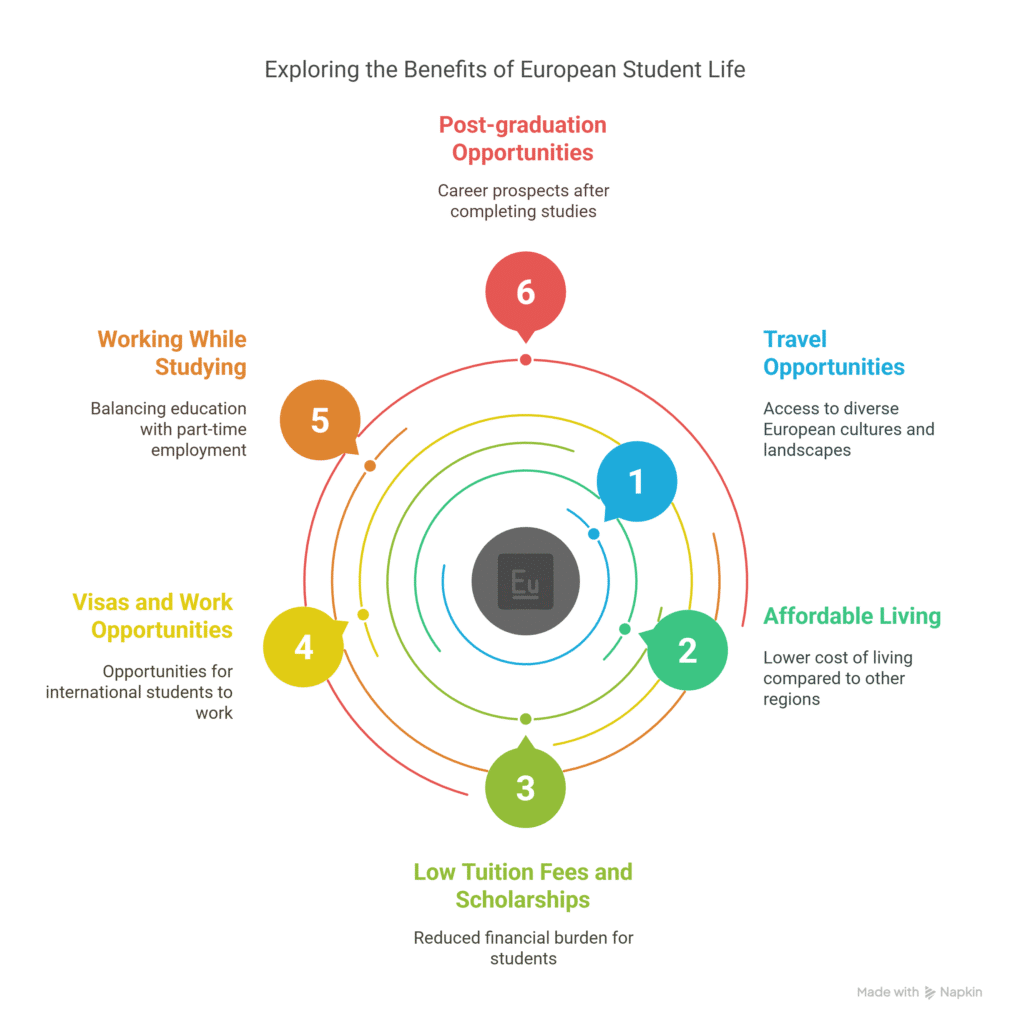Have you been struggling to get enrolled in college abroad, and Europe is your dream destination to study? Well, that’s the kind of dream all students share. However, having the right information is what makes the difference.
If you’re looking for a good education, wide travel opportunities, or are tempted by international exposure, Europe is a no-brainer. In this guide, we will explore student life in Europe and its benefits. So, let’s get into the topic.
Why Europe Is the Best Place for Students?
Europe is not a single country; it comprises over 27 countries with diverse languages, cultures, and areas of academic strength. Altogether, these provide a varied and powerful experience to international students.
So, is Europe good for international students? YES, and here are the reasons why:
Europe is known for its academic heritage. Countries such as the UK, Germany, France, and Italy are considered hubs of some of the oldest universities in the world. The unique mix of traditions and innovations makes Europe the best place to study.
Additionally, it’s not solely about education; the student experience in Europe is vibrant and rich in opportunities. Whether you appreciate vibrant urban living, cultural celebrations, or serene campus environments, Europe provides an excellent mix of learning and enjoyment, making it a great location for both academic and personal development
Academic Excellence in Europe
One of the coolest aspects about studying in Europe is the European Higher Education Area (EHEA). It is made to keep things flexible and student-friendly across the continent. ECTS means you might start your program in one country and move to another without losing your credits!
This means your student life in Europe isn’t just about hitting the books, you get to live in different countries and soak up all kinds of cultures while you study. It’s like getting the best of both worlds!
Best Universities in Europe
You’ll find world’s best universities in terms of rankings in Europe. Such universities practice academic excellence, superior research yields, and hold a very strong international reputation.
Every nation and institution often focuses on specific fields of study. Therefore, when choosing where to pursue your studies, it’s beneficial to match your interests with the strengths of that area.
Subject-Specific Highlights
Want to find the best places to study abroad in Europe based on your field? Every European nation offers a specialization that no other country offers. Here are some excellent options:
- Engineering: Germany, with its strong focus on applied sciences and industry connections, is considered best for engineering-related fields.
- Fashion and Art: France and Italy are home to some of the world’s top design schools.
- Business and Economics: The Netherlands is known for innovative and English-taught programs.
- Sustainability and Tech: Sweden, Denmark, and Finland lead in green innovation .
Picking the best destinations for studying abroad in Europe based on your interests is an amazing decision, as the continent is filled with fantastic options.
And the best part?
Your student life in Europe will be rewarding and full of travel, culture, and new friends.
Perks of Student Life in Europe
Daily student life in EU cities is exciting and comfortable. Most universities possess strong student unions, clubs, and organizations to help newly enrolled students adapt and socialize. From film festivals and food fairs to exciting student parties and cultural outings, there is always something happening.
Here are the benefits of securing student life in Europe:

Travel Opportunities
Traveling is one of the big attractions of studying in Europe.
With the Schengen Visa, students can move freely through 27 nations without border controls. So, you can enjoy breakfast in Berlin, have lunch in Prague, and dine in Vienna, all within a single day
Regarding budget, you do have a shot! The low-cost airline, train, and bus travel options are also very accessible. Europe is not only one of the most fun places to study abroad but also one of the easiest to travel around.
Affordable Living
The expense of living differs significantly from one side of the continent to the other. In Western Europe, such as France, you may encounter an expensive way of life, while Eastern Europe can offer a more affordable yet high-quality lifestyle.
Typically, it costs around €8,000 to €30,000 per month. That’s a budget-friendly options. And therefore, they’re often listed among the cheapest countries to study in Europe for international students.
Tuition Fees and Scholarships
One primary advantage of studying in Europe is a tuition subsidy or even free education. Some of these countries charge tuition fees for non-EU students, while in others, education is free for all citizens.
Here are some of the most affordable options:
- Germany is the top option if you want quality education without breaking your bank. All public universities here are free of cost for local and international students!
- Norway is another great option, as Public institutions charge no tuition; however, you will need to plan for some living expenses.
- Austria and Finland keep tuition low and offer tons of scholarships to help out students.
- Czech is the funnest place to study in Europe. The education is free of cost, even the fees for English-taught programs are very cheap!
Scholarships
Concerned about the expenses that come along with studying abroad? Worry not! The best thing about studying in Europe for international students is that there are many scholarships available. With little planning, you could easily make your dream education a hundred percent feasible.
Europe has lots of ways to help you out:
- Erasmus+: This is a favorite! It supports exchange students across Europe and covers a lot more than just tuition.
- DAAD: This one is for students planning to go to Germany. The German Academic Exchange Service is simply incredible and supports thousands of students annually.
- University scholarships: Various universities have their own funds for incoming international students. Make sure to always check those top choices!
- Government grants: Several European countries specifically fund foreign students. That is free money you definitely would not want to miss.
Want to maximize your chances? Apply early. Furthermore, design the application to show your passion, your aspirations, and your justification of being a perfect fit. Student life in Europe is beyond just lectures and libraries. It’s about new friends, cultures, weekends away from home, and discovering who you are.
Visas and Work Opportunities
Visa rules vary by country, but most students will need a student visa if they’re from outside the EU.
To apply, you’ll usually need:
- A valid passport
- A letter of admission from your university
- Proof of financial resources
- Health insurance
- Possibly a clean criminal record
Check with the embassy of the country where you plan to study. Also, look into the student visa Europe cost, which can vary from €50 to €150 depending on the country.
Also note that the age limit for student visas in Europe may apply in some places — often capped at 30–35 years old, though not always enforced strictly.
Working While Studying
Many students wonder: Can I work while I study?
Yes , most European countries allow part-time work for students. Here are some examples:
- Germany – Up to 120 full days or 240 half days per year
- Netherlands – 16 hours per week
- France – Around 20 hours per week
- Sweden – No official limit, but studies must remain the priority
- Hungary – 25-30 hours per week
Jobs range from cafés and retail to internships in your field. Working helps with living costs and gives valuable experience.
Post-graduation Opportunities
After graduation, many countries offer stay-back visas or job search permits. These allow you to stay in the country for 6 to 18 months while you find a job.
Some of the best countries for employment after graduation are:
- Germany – Strong economy, high demand for skilled workers
- Netherlands – Start-up scene, English-friendly job market
- Sweden and Denmark – Great for tech and sustainability sectors
These countries often lead to long-term career paths and even permanent residency. If you’re planning to settle in Germany after graduation, this visa requirement guide would be helpful.
Choosing the Right European Country and University – Student’s Checklist
When deciding where to go, consider your personal goals and lifestyle preferences. Europe offers something for everyone, so ask yourself:
- What is your field of interest?
- Do you want to study in Europe in English, or learn a new language?
- How important is the cost of living?
- Do you prefer big cities or smaller towns?
- What kind of climate and culture do you enjoy?
Think about how each country aligns with your academic goals and personal comfort. A good fit makes all the difference in your study abroad experience.
Wrap Up
That’s all you need to know about students’ life in Europe. So, if you are ever asked your dream destination to study, the answer would probably be Europe.
Because you obtain a world-class degree, experience different cultures, and develop as a person and in your career. It is much more than education, and it is an experience towards growth.
So, take that first step today: research all the programs available, check the visa options provided, and zoom into the future! Head to the EU Info Hub for more information on studying in Europe.
















Your point of view caught my eye and was very interesting. Thanks. I have a question for you.
Thanks for sharing. I read many of your blog posts, cool, your blog is very good.